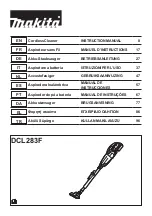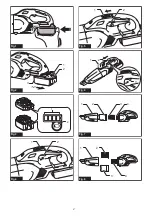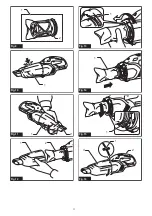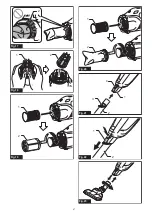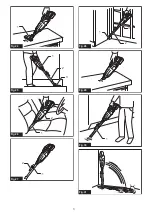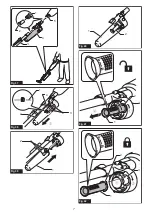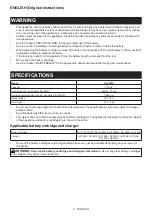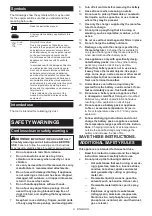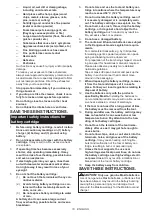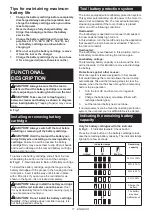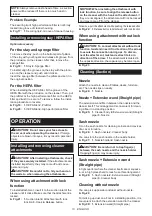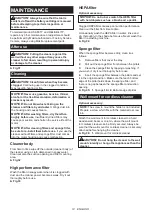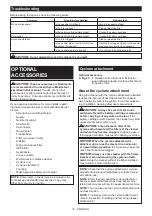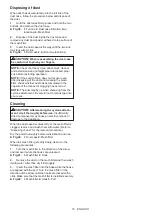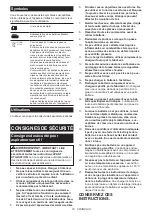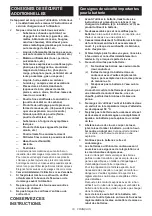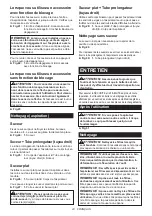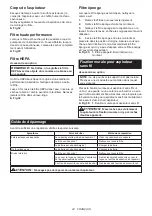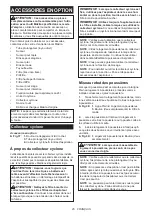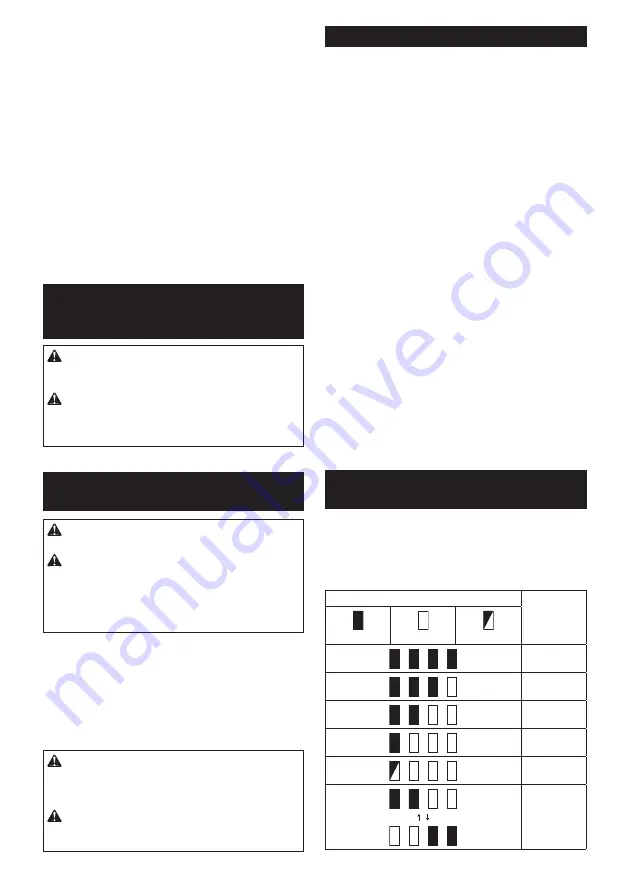
11 ENGLISH
Tips for maintaining maximum
battery life
1.
Charge the battery cartridge before completely
discharged. Always stop tool operation and
charge the battery cartridge when you notice
less tool power.
2.
Never recharge a fully charged battery car-
tridge. Overcharging shortens the battery
service life.
3.
Charge the battery cartridge with room tem-
perature at 10 °C - 40 °C (50 °F - 104 °F). Let
a hot battery cartridge cool down before
charging it.
4.
When not using the battery cartridge, remove
it from the tool or the charger.
5.
Charge the battery cartridge if you do not use
it for a long period (more than six months).
FUNCTIONAL
DESCRIPTION
CAUTION:
Always be sure that the tool is
switched off and the battery cartridge is removed
before adjusting or checking function on the tool.
CAUTION:
Take care not to trap finger(s)
between cleaner and battery as shown in diagram
when loading battery.
Trapping finger(s) may cause
injury.
►
Fig.1
Installing or removing battery
cartridge
CAUTION:
Always switch off the tool before
installing or removing of the battery cartridge.
CAUTION:
Hold the tool and the battery car-
tridge firmly when installing or removing battery
cartridge.
Failure to hold the tool and the battery
cartridge firmly may cause them to slip off your hands
and result in damage to the tool and battery cartridge
and a personal injury.
To remove the battery cartridge, slide it from the tool
while sliding the button on the front of the cartridge.
►
Fig.2:
1.
Red indicator
2.
Button
3.
Battery cartridge
To install the battery cartridge, align the tongue on the
battery cartridge with the groove in the housing and slip
it into place. Insert it all the way until it locks in place
with a little click. If you can see the red indicator as
shown in the figure, it is not locked completely.
CAUTION:
Always install the battery cartridge
fully until the red indicator cannot be seen.
If not,
it may accidentally fall out of the tool, causing injury to
you or someone around you.
CAUTION:
Do not install the battery cartridge
forcibly.
If the cartridge does not slide in easily, it is
not being inserted correctly.
Tool / battery protection system
The tool is equipped with tool/battery protection system.
This system automatically cuts off power to the motor to
extend tool and battery life. The tool will automatically
stop during operation if the tool or battery is placed
under one of the following conditions.
Overloaded:
The tool/battery is operated in a manner that causes it
to draw an abnormally high current.
In this situation, turn the tool off and stop the application
that caused the tool to become overloaded. Then turn
the tool on to restart.
Overheated:
The tool/battery is overheated. In this situation, let the
tool/battery cool before turning the tool on again.
Low battery voltage:
The remaining battery capacity is too low and the tool
will not operate. In this situation, remove and recharge
the battery.
Protections against other causes:
Protection system is also designed for other causes
that could damage the tool and allows the tool to stop
automatically. Take all the following steps to clear the
causes, when the tool has been brought to a temporary
halt or stop in operation.
1. Turn the tool off, and then turn it on again to
restart.
2. Charge the battery(ies) or replace it/them with
recharged battery(ies).
3. Let the tool and battery(ies) cool down.
If no improvement can be found by restoring protection
system, then contact your local Makita Service Center.
Indicating the remaining battery
capacity
Only for battery cartridges with the indicator
►
Fig.3:
1.
Indicator lamps
2.
Check button
Press the check button on the battery cartridge to indi-
cate the remaining battery capacity. The indicator lamps
light up for a few seconds.
Indicator lamps
Remaining
capacity
Lighted
Off
Blinking
75% to 100%
50% to 75%
25% to 50%
0% to 25%
Charge the
battery.
The battery
may have
malfunctioned.
Summary of Contents for DCL283FZW
Page 2: ...2 Fig 1 1 2 3 Fig 2 1 2 Fig 3 1 2 Fig 4 1 2 Fig 5 1 2 3 Fig 6 1 3 4 2 Fig 7 1 2 3 4 Fig 8 ...
Page 3: ...3 2 1 Fig 9 1 Fig 10 1 2 Fig 11 1 2 Fig 12 1 Fig 13 1 Fig 14 1 Fig 15 1 2 3 Fig 16 ...
Page 4: ...4 1 2 Fig 17 1 2 Fig 18 1 2 Fig 19 1 2 Fig 20 1 2 3 4 Fig 21 1 2 Fig 22 Fig 23 ...
Page 5: ...5 1 Fig 24 1 2 3 Fig 25 1 2 Fig 26 1 2 Fig 27 1 2 3 Fig 28 Fig 29 1 Fig 30 Fig 31 ...
Page 6: ...6 Fig 32 Fig 33 Fig 34 1 2 Fig 35 1 Fig 36 ...
Page 7: ...7 3 4 1 2 5 Fig 37 2 3 1 4 Fig 38 2 1 Fig 39 2 1 Fig 40 1 2 Fig 41 1 2 3 Fig 42 ...

